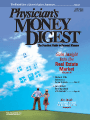Publication
Article
Physician's Money Digest
One Hand Giving, Another Taking?
Author(s):
By the time you read this,some form of prescriptiondrug benefit for the nation's40 million Medicare enrollees willlikely be near completion. It's the firstmajor change to the massive seniorcitizen health care program since its1965 creation. On many levels itmakes sense—but I'm still worried.
There's little question now thatprescription drugs are a front-linemeans of treatment. According to theNational Association of Chain DrugStores, more than 80% of patientswho walk into a doctor's office leavewith a prescription in hand.
And with US seniors being thefastest-growing population segment,it stands to reason that theyhave and will continue to have escalatingdrug care costs. Moreover,according to the Kaiser FamilyFoundation, about 25% of USseniors have no prescription drugcoverage. Throw in the aging baby-boomergeneration and you havethe makings of a potentially hugefuture Rx drug need.
While I certainly comprehendthe politics of why the president andCongress want aMedicare drug benefit(ie, to preservetheir jobs; seniorsare the most reliablevoters), I'm less sure abouthow well this new government programwill operate. In fact, the estimated$400 billion benefit (somenumber-crunchers say the realfuture unfunded liability will reach$7 trillion) comes with little or nomajor reforms of Medicare or anyoffsetting budget cuts to pay for it.Annual Medicare expendituresalready top $250 billion a year now.
DOCTORS KNOW
Better than most, America'sphysicians know the failings of ourMedicare system. Just consider:
• A California doctor told mehe recently received a Medicarereimbursement check in the mailin the amount of 20 cents. "That'sless than the cost to mail thething," he said. "It's ridiculous.What are they thinking?"
• A New Jersey doctor told me ofwealthy patients who drive to hisoffice in luxuryautos and pay byMedicare. "I supposethey feel it'stheirs because theypaid into the system," he said. "But itstill strikes me as not right."
Although those 2 doctor experiencesmay be just anecdotal, otherreal problems concern me. Accordingto the US Office of Management& Budget, more than $13billion in improper Medicare paymentswere made last year.Meanwhile, Medicare reimbursementsfor doctors in recent yearshave either been declining or increasingat rates below inflation.
Republicans have largely backedaway from a market-driven Medicaredrug plan that would have offeredricher drug benefits to seniors whomove into private plans like preferredprovider organizations (PPOs). Thelegislative compromise calls for givingequal subsidies to seniors,whether they opt for a PPO arrangementor choose to remain inMedicare's traditional fee-for-serviceplan. Basically, it's a 1-size-fits-all,antichoice plan. In fact, more thanone third of all seniors with employer-sponsored health plans will losetheir drug coverage under the plan.
REASON FOR HOPE?
Optimistic doctors might thinkthe plan will have a meaningfulimpact on improving US health care.After all, doctors are the ones writingthe prescriptions. They should continueto dictate the best means oftreatment for their patients. And doctorsknow the massive costs thatoften accompany prolonged illnesseswithout effective drug treatment—staggering hospital and doctor billsand lost wages and productivity.
Then again, realistic doctors,who know how government canreally foul things up, must wonder—is this another step towardstate-run health care?
